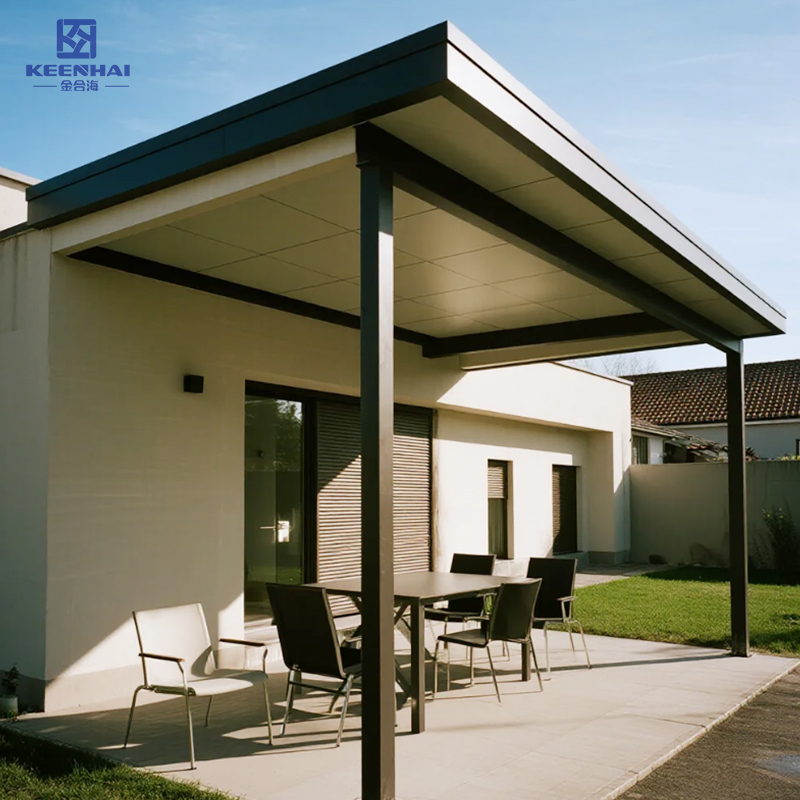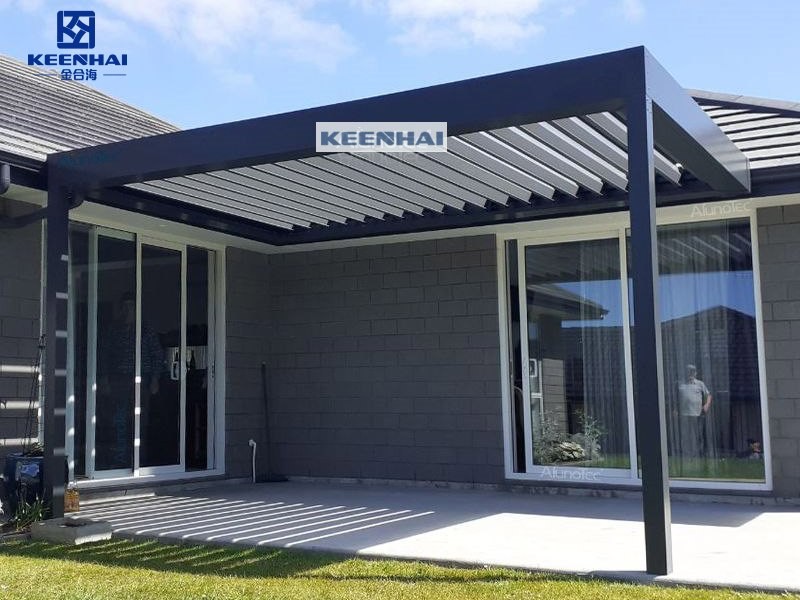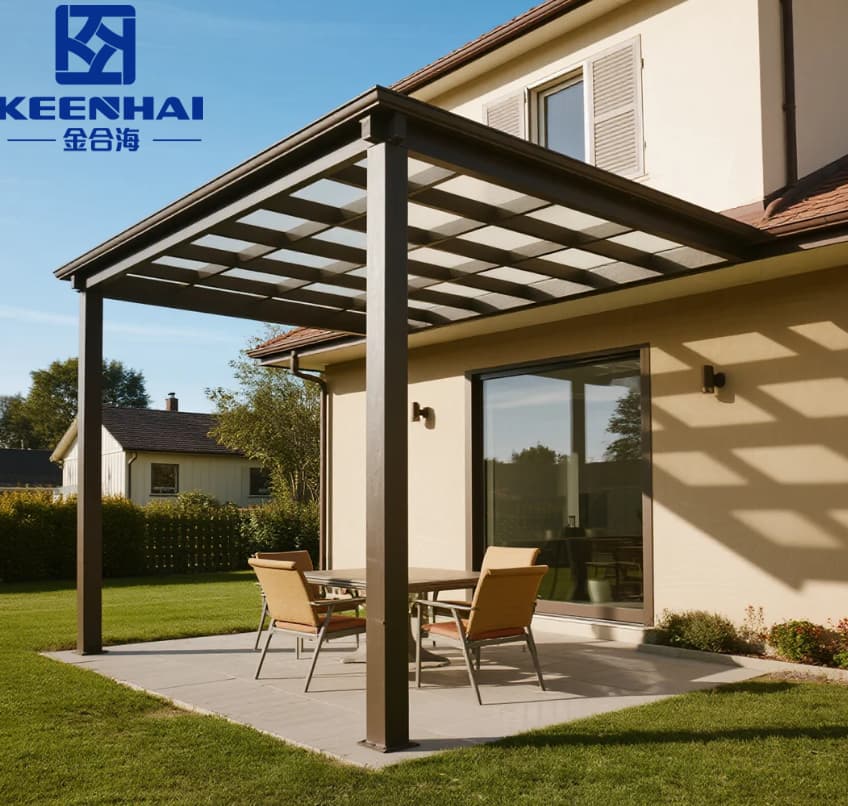
1. Choosing the Right Size and Shape
1.1 Measuring Your Garden Space Accurately
Before you order an Aluminum Pergola, measuring your backyard space is critical. Many homeowners make the mistake of eyeballing dimensions, which leads to pergolas that look cramped or leave wasted space. Here’s a reliable step-by-step approach:
-
Measure the total width and length of the intended area, including overhangs for plants or walkways.
-
Check clearance heights—ensure enough headroom for people and furniture. A standard outdoor seating area usually requires at least 7 feet of height.
-
Note fixed obstacles like trees, fences, or garden structures that could interfere with installation.
-
Sketch a scaled layout on paper or use simple software tools to visualize the pergola in the space.
For instance, a homeowner in Phoenix installed a 12x14 ft aluminum pergola on a patio. By carefully measuring and accounting for a corner planter, the pergola perfectly framed their outdoor dining area, creating a comfortable, functional space.
1.2 Selecting Standard vs Custom Dimensions
Aluminum pergolas come in both standard and fully custom sizes. Standard models are cost-effective and quick to ship, while custom designs allow you to match unique garden layouts or specific furniture arrangements.
| Feature | Standard Size | Custom Size |
|---|---|---|
| Cost | Lower | Higher |
| Lead Time | 1–2 weeks | 3–6 weeks |
| Fit | Works for most patios | Tailored to exact space |
| Design Flexibility | Limited | High |
If your backyard has irregular shapes or multiple zones for lounging and dining, custom dimensions ensure that every corner is utilized efficiently. A couple in Chicago chose a custom 16x10 ft pergola to fit between their pool and vegetable garden, turning the space into an integrated outdoor living area.
1.3 Matching Pergola Shape to Garden Layout
The shape of the pergola affects both aesthetics and usability. Rectangular or square designs fit neatly along patios and decks, while L-shaped or extended models suit larger gardens or combined seating and dining areas.
Tips for choosing the right shape:
-
Consider foot traffic patterns to avoid obstructing pathways.
-
Align with existing features like fountains, pools, or patios for visual harmony.
-
Blend with landscaping elements, such as planting beds or garden sheds, to create a cohesive outdoor living space.
For a modern backyard in Austin, homeowners installed an Aluminum Pergola House with a rectangular footprint. This layout perfectly matched their patio and firepit, maximizing usability while maintaining a clean, contemporary look.

2. Selecting Materials and Finishes
2.1 Aluminum Profiles and Powder Coating Options
When customizing an Aluminum Pergola, choosing the right aluminum profile is crucial for strength and durability. Most outdoor pergolas use 6063-T5 aluminum, known for its high corrosion resistance and rigidity. Profiles come in square, rectangular, and round shapes, allowing flexibility for different designs.
Powder coating adds both style and protection:
-
Enhances durability – protects against scratches, fading, and weathering.
-
Reduces maintenance – unlike wood, you won’t need annual sealing or repainting.
-
Expands design options – available in nearly any color, from classic white to modern charcoal.
For example, a modern patio in Los Angeles used rectangular 6063-T5 profiles with matte charcoal powder coating, resulting in a sleek, maintenance-free pergola that complements their stone patio and surrounding greenery.
2.2 Choosing Colors to Complement Your Garden
Color selection affects both aesthetics and the feel of your outdoor living space. Neutral tones like white, gray, or beige create a versatile backdrop, while darker shades like bronze or black add a contemporary edge.
Tips for color selection:
-
Match garden features – coordinate with fences, furniture, and decking.
-
Consider sunlight exposure – darker colors absorb heat, while lighter colors reflect it.
-
Blend with plantings – choose colors that highlight greenery or flowers.
For instance, a homeowner in Miami chose a soft beige powder coating to harmonize with tropical plants and a light-colored deck, creating a bright and airy backyard retreat.
2.3 Weather-Resistant and Low-Maintenance Materials
One of the biggest advantages of aluminum pergolas over wood is longevity under all weather conditions. Aluminum resists rot, warping, termites, and moisture damage. Powder-coated finishes can withstand sun, rain, and snow without fading or peeling.
| Material Feature | Aluminum Pergola | Wood Pergola |
|---|---|---|
| Resistance to Rot | High | Low |
| Termite Damage | None | High Risk |
| Maintenance Frequency | Low | Annual |
| Lifespan | 20+ years | 5–10 years |
Outdoor cafés in Seattle often select Aluminum Modern Gazebo for poolside areas because it stays intact despite frequent rain, requiring minimal upkeep. Residential homeowners also appreciate this low-maintenance benefit, as it allows them to enjoy their patio without worrying about seasonal repairs.

3. Designing Roof and Shade Options
3.1 Fixed vs Adjustable Louvers
Choosing the right louver type is essential for both comfort and usability. Fixed louvers provide a permanent, solid roof that blocks sun and rain, offering a consistent shaded area. Adjustable louvers allow you to control light and airflow throughout the day, making them ideal for patios or garden spaces that require flexibility.
Step-by-step decision guide:
-
Assess your climate – areas with strong sun or frequent rain benefit from adjustable louvers.
-
Determine use cases – if you plan to host gatherings or enjoy sunlight control, adjustable is better.
-
Measure installation space – adjustable louvers require slightly more clearance for rotation.
For example, a homeowner in Houston installed Aluminum Pergola with motorized adjustable louvers over their outdoor dining area. This setup allowed them to enjoy morning sun and evening shade without changing furniture placement.
3.2 Retractable Canopies and Fabric Options
Retractable canopies add versatility, especially for patios where sunlight and rain vary. They can be manually pulled out or motorized for ease of use. Fabric choices also influence durability and aesthetics.
Tips for selecting canopies:
-
Choose UV-resistant fabrics to prevent fading and protect outdoor furniture.
-
Select waterproof or water-resistant materials for rain protection.
-
Consider color and pattern to match garden landscaping or existing furniture.
A Miami backyard incorporated a soft gray, waterproof retractable canopy over an Aluminum Modern Gazebo. This design balanced sun protection and style, while allowing residents to retract the canopy on sunny mornings to enjoy direct light.
3.3 Optimizing Sunlight and Ventilation
Proper pergola design ensures natural light and airflow are optimized for comfort and energy efficiency. Adjustable louvers or retractable canopies allow homeowners to:
-
Regulate sunlight – angle louvers to block harsh afternoon rays while keeping morning sun.
-
Enhance airflow – spacing slats or raising fabric slightly improves ventilation, reducing heat accumulation.
-
Integrate greenery – climbing plants on pergola columns or side trellises create natural shade while enhancing airflow.
| Feature | Aluminum Pergola | Traditional Wood Pergola |
|---|---|---|
| Adjustable Louvers | Yes | Rare |
| Ventilation | High | Moderate |
| Sunlight Control | Precise | Limited |
A backyard patio in Los Angeles used a combination of adjustable louvers and retractable canopy to create a multi-functional outdoor living area. The pergola allowed morning sun for breakfast, afternoon shade for relaxation, and evening airflow for dining.

4. Adding Functional Accessories
4.1 Integrated Lighting Solutions
Adding lighting transforms your pergola from a daytime retreat to a cozy evening space. Integrated LED strips or spotlights offer both functionality and ambiance, letting you enjoy patios or gardens after sunset.
Installation tips:
-
Plan lighting zones – define areas for dining, relaxation, or pathways.
-
Choose dimmable LEDs – allows flexible mood settings.
-
Ensure weatherproof connections – outdoor-rated fixtures prevent corrosion and short circuits.
A homeowner in Austin installed Aluminum Pergola with built-in warm LED strips along the beams. This setup provided soft, even illumination for their backyard seating and seamlessly integrated with evening garden activities.
4.2 Motorized Louvers and Automation Features
Motorized louvers add convenience, enabling you to adjust sunlight and airflow with a button or app. Automation can also include smart timers or remote controls for optimal use throughout the day.
Step-by-step considerations:
-
Select the motor type – AC motors are durable for frequent use; DC motors are quieter for residential areas.
-
Integrate with smart home systems – connect to apps or voice control for remote adjustments.
-
Test louver range – ensure full rotation without obstruction.
For example, a modern patio in Los Angeles installed a motorized Aluminum Modern Gazebo over a poolside lounge. The louvers were automated to open in the morning and close at night, providing consistent shade while simplifying operation.
4.3 Heating Elements, Fans, and Side Screens
Functional accessories extend your pergola’s usability year-round. Ceiling fans enhance airflow in summer, while outdoor heaters keep the patio comfortable during cooler months. Side screens offer privacy, wind protection, and extra shade.
| Accessory | Benefit | Typical Use |
|---|---|---|
| Fans | Air circulation, cooling | Hot summer afternoons |
| Heaters | Warmth, extended usability | Fall and winter evenings |
| Side Screens | Privacy, wind protection | Garden or poolside areas |
A Chicago backyard installed a combination of a small infrared heater and retractable side screens on an Aluminum Pergola House. The result was a versatile outdoor living area, comfortable in all seasons and protected from unpredictable winds.
